Gamers are funny. Some gravitate towards the heavy conflict, punch-an-enemy-in-the-face type games. Others need a more calm, safe space to pursue building and planning. Depending on where you fit on the spectrum, the list below might delight you or serve as a warning for what games to stay away from.
These are games that gravitate towards the “opponents optional” end of the spectrum. Their mechanisms usually involve resource denial or bonus rewards only when players take certain actions. In this list, I’ve tried hard to find games that lack any source of direct interaction with competition that usually revolves around engine building and being the first person to get points. If you have friends that you don’t like to fight with, check out the list below.
One thing readers should know about the ranking here is that games move up on the list for having less player interaction. However, once that’s about even, the overall fun of the game decides the ties.
Top 10 Multiplayer Solitaire Games
Honorable Mention: Suburbia (review)
 City building games have a weird dichotomy. Either all players focus on the same city in a competitive race to build bigger and better buildings, or they each have their own city to make their civic planning dreams come true. Suburbia is of the latter variety and it certainly feels like a solo game at times. What keeps it off this list is the ridiculous analysis paralysis that it induces. There are many computations to make in play, and, even though it converts well to a solo game, these computations just feel like unappealing added weight that slows play. It’s good, just not list-worthy.
City building games have a weird dichotomy. Either all players focus on the same city in a competitive race to build bigger and better buildings, or they each have their own city to make their civic planning dreams come true. Suburbia is of the latter variety and it certainly feels like a solo game at times. What keeps it off this list is the ridiculous analysis paralysis that it induces. There are many computations to make in play, and, even though it converts well to a solo game, these computations just feel like unappealing added weight that slows play. It’s good, just not list-worthy.
1-4 Players • Ages 8+ • 90 minutes • $40
10. Blueprints
 Before the age of Sagrada and Roll Player, there was a small box game called Blueprints. When I first encountered this gem, I wanted to write it off as a cheesy dice game with no real bite. I am very happy to report how wrong I was. Players in Blueprints are all working on constructing their own buildings behind player shields by drafting dice from a pool. Depending on what points players are going for, they’ll need different materials represented by the different colored dice. Usually taking a die that your opponent needs is harder to gauge unless players keep in memory what materials opponents want. Usually just focusing on your own path to points will have you achieving a fine score.
Before the age of Sagrada and Roll Player, there was a small box game called Blueprints. When I first encountered this gem, I wanted to write it off as a cheesy dice game with no real bite. I am very happy to report how wrong I was. Players in Blueprints are all working on constructing their own buildings behind player shields by drafting dice from a pool. Depending on what points players are going for, they’ll need different materials represented by the different colored dice. Usually taking a die that your opponent needs is harder to gauge unless players keep in memory what materials opponents want. Usually just focusing on your own path to points will have you achieving a fine score.
2-4 Players • Ages 14+ • 30 minutes • $25
9. Glass Road (review)
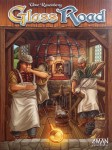 Player boards are a common component in multiplayer solitaire games and Glass Road doesn’t disappoint. Similar to farm-building, city-building, nature park building, players in Glass Road are artisans in Bavaria making glass, clearing land, and gathering resources. Play progresses with a limited hand of action cards, and players who choose an action that no other player takes get the bonus of additional actions. As will be seen in other games in this list, a bonus or penalty from anticipating opponents moves typifies the so-called interaction of the game. What’s really at work is efficiency in decision-making vs undesirable outcomes.
Player boards are a common component in multiplayer solitaire games and Glass Road doesn’t disappoint. Similar to farm-building, city-building, nature park building, players in Glass Road are artisans in Bavaria making glass, clearing land, and gathering resources. Play progresses with a limited hand of action cards, and players who choose an action that no other player takes get the bonus of additional actions. As will be seen in other games in this list, a bonus or penalty from anticipating opponents moves typifies the so-called interaction of the game. What’s really at work is efficiency in decision-making vs undesirable outcomes.
1-4 Players • Ages 13+ • 60 minutes • $60
8. Pulsar 2849 (review)
 Gamers looking for their solitaire journey through space should pause on this entry. Pulsar 2849 fits into the “point-salad” category, but in reality, the dice-drafting mechanism, which is common to games which can feel like solitaire, is a means to allow actions without too much consideration for how other players have affected a resource pool. If a die gets chosen before your turn, it’s just a reduced set of options. Otherwise, you’re free to fly around space and pick up technologies and harvest pulsars. This game perfectly shows what a lot of titles do, grant points for being efficient enough to do the cool stuff first.
Gamers looking for their solitaire journey through space should pause on this entry. Pulsar 2849 fits into the “point-salad” category, but in reality, the dice-drafting mechanism, which is common to games which can feel like solitaire, is a means to allow actions without too much consideration for how other players have affected a resource pool. If a die gets chosen before your turn, it’s just a reduced set of options. Otherwise, you’re free to fly around space and pick up technologies and harvest pulsars. This game perfectly shows what a lot of titles do, grant points for being efficient enough to do the cool stuff first.
1-4 Players • Ages 8+ • 90 minutes • $45
7. Orleans
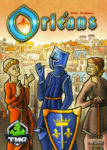 While other games in the resource denial genre rely on action selection or drafting, Orleans is the first title with a cyclical operation that has players building up a pool of actions turn over turn. The scarce worker discs drafted in this “bag-building” game focus a player’s scope of actions. However, where these actions get used is mostly on independent player boards. In the end, again, the most efficient play wins, and so much of the fun is all about building just the right engine of actions.
While other games in the resource denial genre rely on action selection or drafting, Orleans is the first title with a cyclical operation that has players building up a pool of actions turn over turn. The scarce worker discs drafted in this “bag-building” game focus a player’s scope of actions. However, where these actions get used is mostly on independent player boards. In the end, again, the most efficient play wins, and so much of the fun is all about building just the right engine of actions.
2-4 Players • Ages 12+ • 90 minutes • $40
6. Heaven & Ale (review)
 As one of the more unique games on the list, Heaven & Ale makes its mark because each cycle of the game is really a worker placement/action selection mechanism where players constantly move forward around the game track. Actions are exclusionary, so players cannot take actions that others reached first, but much more common is the case that players take an action available just because it is most efficient for them (you should be getting the theme of this list by now). Decisions in Heaven and Ale revolve around placing tiles on a player’s personal board (another common component) and combining that placement with other tiles to cause a chain of advancements for scoring markers. The fist-pump joy of a single good play from a series of preparatory moves is another characteristic exemplified in these games.
As one of the more unique games on the list, Heaven & Ale makes its mark because each cycle of the game is really a worker placement/action selection mechanism where players constantly move forward around the game track. Actions are exclusionary, so players cannot take actions that others reached first, but much more common is the case that players take an action available just because it is most efficient for them (you should be getting the theme of this list by now). Decisions in Heaven and Ale revolve around placing tiles on a player’s personal board (another common component) and combining that placement with other tiles to cause a chain of advancements for scoring markers. The fist-pump joy of a single good play from a series of preparatory moves is another characteristic exemplified in these games.
2-4 Players • Ages 12+ • 60-90 minutes • $45
5. Puerto Rico
 One of the mechanisms that produces a highly non-confrontational play structure is the action-selection-follow structure for turns. In Puerto Rico, each turn has a player make an action/role choice. The selecting player gets a bonus for that action. Everyone else who would like to perform that action gets to follow. If it’s efficient for other players, that just lets them progress their game, but there’s not a lot the acting player can do to prevent opponents from getting that advantage. In the end, it’s really a game of anticipating what opponents would need, but much of it is really just spent focusing on what you need to get your own plantations producing.
One of the mechanisms that produces a highly non-confrontational play structure is the action-selection-follow structure for turns. In Puerto Rico, each turn has a player make an action/role choice. The selecting player gets a bonus for that action. Everyone else who would like to perform that action gets to follow. If it’s efficient for other players, that just lets them progress their game, but there’s not a lot the acting player can do to prevent opponents from getting that advantage. In the end, it’s really a game of anticipating what opponents would need, but much of it is really just spent focusing on what you need to get your own plantations producing.
2-5 Players • Ages 12+ • 90-120 minutes • $30
4. Dominion (review)
 Like Orleans above, Dominion’s solitaire nature of play works in a cyclical engine-building structure. There is the possibility, with the right game setup, that Dominion can be filled with direct conflict, but just as often, the game is merely about drafting the right cards in this deck-building game. Since the number of actions to be taken is limited, drafting the right combination of cards and having them appear in a hand together is the meat of the play. And, like other good multiplayer solitaire games, there’s a race element to end the game when the time is right.
Like Orleans above, Dominion’s solitaire nature of play works in a cyclical engine-building structure. There is the possibility, with the right game setup, that Dominion can be filled with direct conflict, but just as often, the game is merely about drafting the right cards in this deck-building game. Since the number of actions to be taken is limited, drafting the right combination of cards and having them appear in a hand together is the meat of the play. And, like other good multiplayer solitaire games, there’s a race element to end the game when the time is right.
2-4 Players • Ages 13+ • 30 minutes • $30
3. Race for the Galaxy
 Combining many of the elements of other games above, Race for the Galaxy (just the core game) combines elements which make multiplayer solitaire games great. It’s got an action-selection-follow mechanism. It’s got an engine-building mechanism where cards selected on previous turns build up future actions. It’s also got a drafting mechanism where a choice of several cards requires taking needed ones before opponents can see them. And, last but not least, it has a race mechanism. The first player to either collect all the victory point tokens or have a certain number of cards in their tableau ends the game. Of course, the game is still decided by victory points.
Combining many of the elements of other games above, Race for the Galaxy (just the core game) combines elements which make multiplayer solitaire games great. It’s got an action-selection-follow mechanism. It’s got an engine-building mechanism where cards selected on previous turns build up future actions. It’s also got a drafting mechanism where a choice of several cards requires taking needed ones before opponents can see them. And, last but not least, it has a race mechanism. The first player to either collect all the victory point tokens or have a certain number of cards in their tableau ends the game. Of course, the game is still decided by victory points.
2-4 Players • Ages 12+ • 30-60 minutes • $30
2. Welcome To…
 At this point in the list, we have to stop. Opponents can get out here because from here on out, the remaining games pretty much play the same whether you have antagonists or not. Welcome To… stands in for all the roll-and-write (in this case card-flip-and-write) games out there; it just happens to be my favorite. It’s a race in the sense that the end of the game comes from a player achieving the end game objective, but ultimately, the player who made the most efficient decisions of placing house numbers on a score pad while following the point-based objectives wins. Besides coughing loudly to distract other players, there’s not much to deter your opponents (if any).
At this point in the list, we have to stop. Opponents can get out here because from here on out, the remaining games pretty much play the same whether you have antagonists or not. Welcome To… stands in for all the roll-and-write (in this case card-flip-and-write) games out there; it just happens to be my favorite. It’s a race in the sense that the end of the game comes from a player achieving the end game objective, but ultimately, the player who made the most efficient decisions of placing house numbers on a score pad while following the point-based objectives wins. Besides coughing loudly to distract other players, there’s not much to deter your opponents (if any).
1-100 Players • Ages 10+ • 25 minutes • $25
1. Karuba (review)
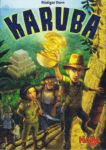 Like Welcome To… , Karuba finds itself in the same category. While Welcome To… presents players with 3 decisions each turn, Karuba takes one step further and gives players only 2 decisions for their tile laying. Here, one player reveals tiles from a stack and every other player chooses to either place that same tile from their own supply onto their player board or remove it and advance an adventurer towards a goal. There is literally nothing an opponent can do to stop other players from playing well and winning. Players can even take the exact same moves as an opponent. As a result, some victories may come down to sheer luck in this light game, but the decisions still feel meaty. At the top of this list, playing alone feels just a hair off from playing with others (minus the gloating).
Like Welcome To… , Karuba finds itself in the same category. While Welcome To… presents players with 3 decisions each turn, Karuba takes one step further and gives players only 2 decisions for their tile laying. Here, one player reveals tiles from a stack and every other player chooses to either place that same tile from their own supply onto their player board or remove it and advance an adventurer towards a goal. There is literally nothing an opponent can do to stop other players from playing well and winning. Players can even take the exact same moves as an opponent. As a result, some victories may come down to sheer luck in this light game, but the decisions still feel meaty. At the top of this list, playing alone feels just a hair off from playing with others (minus the gloating).
2-4 Players • Ages 8+ • 30 minutes • $35







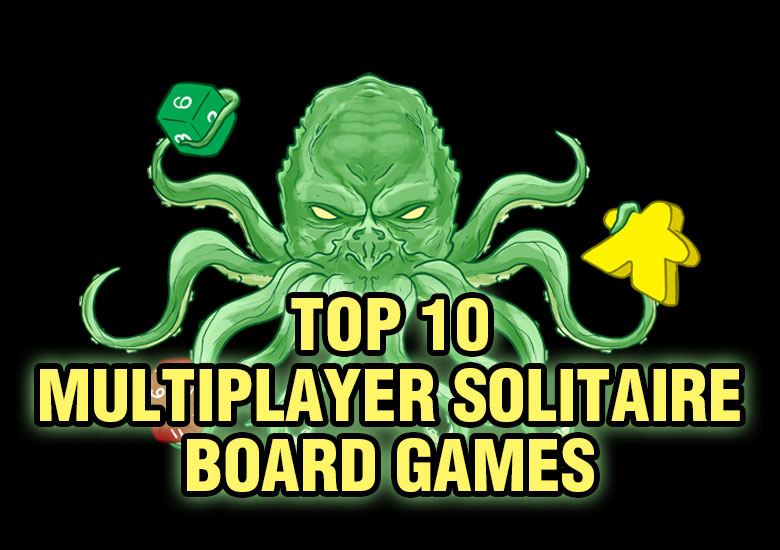


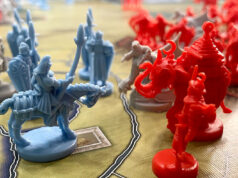











It seems you and I have a different definition of multi-player solitaire games. I agree with you on something like “Welcome To…” (especially since it can scale to an effectively infinite number of players) but most of these games have much more interaction than I think you are letting on. For example, “Glass Road” and “Race for the Galaxy” have a ton of interaction as optimal play requires that you consider your opponent’s plans and actions. If you treat those games as multi-player solitaire then you’ll lose to any non-new player every time.
Also, this quote seems like a bit of an oxymoron: “And, like other good multiplayer solitaire games, there’s a race element to end the game when the time is right.” A race element is a form of indirect interaction. I aim to end the game when its best for me as compared to other players. Personally, I think the existence of a meaningful race automatically indicates that it is NOT a true multi-player solitaire game.
To be clear, this is an amazing list of games and all warrant recommendation. But in my opinion, this list is better described as something like “Best Games with Indirect Interaction” rather than multi-player solitaire.
P.S. Race for the Galaxy doesn’t have anything even remotely close to drafting.
Thanks for the comments Colin! As I mentioned in the beginning, the list is a discussion point on how much of what kind of interaction players are looking for from a game. Indirect interaction by its nature can make players feel like they’re playing with a puzzle and not with opponents.
As far as Race for the Galaxy not having an element of drafting, while it is true you do not hand cards back to opponents, cards you pass on can go back into the cycle which can get picked up later. To decide which cards to keep and which cards to let go is, to me anyways, a sort of draft.
That’s definitely not a draft. A lot of cards don’t get seen by the other players, or by any players at all, and in my experience the deck will not be cycled through often (usually once a game at 2 players). Sorry, but it’s plainly incorrect.